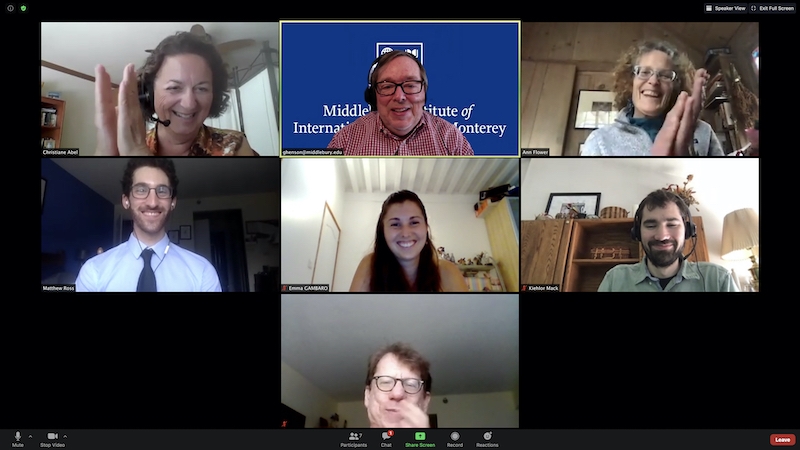Professor Abel Interprets for Author Éric Vuillard
| by Eva Gudbergsdottir
Professor Christiane Abel interpreted for the celebrated French author Eric Vuillard during the U.S. tour which was organized by the French Embassy.

Middlebury Institute Translation student Matthew Mogulescu Ross MAT ’20 successfully defended his thesis translation of “Les Loups” by Eugene Klein, a memoir of a holocaust survivor from French to English via Zoom.
2020 marked the 75th anniversary of the liberation of Auschwitz, a reminder, says Ross, that the voices of those who survived and those who fought the Nazis are growing fewer and fewer. “I chose to translate a Holocaust survivor testimony because it is critical that these stories be shared, lest we forget the tragedy and horror of what occurred.” He contacted several organizations in search of a text to translate and received a response from the Foundation for the Memory of the Shoah (la Fondation pour la Mémoire de la Shoah), which offered him the memoir of Eugène Klein.
Professor Christiane Abel was Ross’s thesis advisor, Professor George Henson and Director of the Library Ann Flower were his readers. Also present at the defense were his dad, his fiancée, and a friend. Matthew’s work was unanimously assessed as “outstanding” by the committee.
Born in Hungary in 1898, Eugène Klein served in the Austro-Hungarian Army in World War I, the Hungarian Red Army in 1918, and Miklós Horthy’s White Army in 1920. While serving in the White Army, he took up track and field, which led him to immigrate to France and become a track and field star. When World War II broke out, Eugène was mobilized and fought in the French Army until an armistice was signed between France and Germany. On May 1, 1943, Eugène, his wife Rose, and his son Georges were interned at Drancy and subsequently deported to Auschwitz, where Eugène and Georges were separated from Rose. Eugène was then separated from Georges and sent to a series of concentration camps. After two years in hell, Eugène made his way back to Paris and was reunited with Rose, but his son Georges never returned from the camps.
I ended up researching not only the Holocaust and World War II, but also Hungary in the early 20th century, World War I, photography, sculpture, kerosene lamps, the geography of Europe, French sports federations, military terminology, and much more.
“When I began this project, I had assumed that my research would focus almost exclusively on the Holocaust,” Ross says. “However, the narrative is as much an autobiography as it is an account of Eugène’s experience in the camps. Indeed, the five chapters that Eugène spends recalling the events of his life preceding his deportation total 15,496 words, compared to the 14,333 words he dedicates over seven chapters to describing his experience during the Holocaust. I ended up researching not only the Holocaust and World War II, but also Hungary in the early 20th century, World War I, photography, sculpture, kerosene lamps, the geography of Europe, French sports federations, military terminology, and much more.”
Ross says that Les Loups is a literary text that aims first and foremost to convey the author’s horrific experience during the Holocaust and honor the memory of those who perished at the hands of the Nazis. At the same time, he adds, “the text is also an autobiography and an account of the virulent anti-Semitism that was rampant in Hungary during the early 20th century. With this in mind, I approached the translation with a register that would correspond to the gravity of the subject matter without surpassing the author’s own register, which is not particularly formal, and even somewhat conversational during the autobiographical chapters.”
Ross hopes the translation will be published by the Foundation.
Eva Gudbergsdottir
eva@middlebury.edu
831.647.6606
| by Eva Gudbergsdottir
Professor Christiane Abel interpreted for the celebrated French author Eric Vuillard during the U.S. tour which was organized by the French Embassy.
| by Eva Gudbergsdottir
Middlebury Institute alumni, Hilary Ancel-James MAT ’03, and Kunyuan (Lawrence) Chen MACI ’17, won first prize in the prestigious UN St. Jerome Translation Competition in the general category for their English and Chinese translations.
| by Eva Gudbergsdottir
Middlebury Institute student Jem Walker MATI ’21 won first prize in the UN organized St. Jerome Translation Competition for his translation from French into English.